- Home
- Marina Oliver
Eugenie and the Earl Page 11
Eugenie and the Earl Read online
Page 11
'I really do not mind,' Eugenie tried to reassure her. 'I can come to London for the Season, if I can hire a suitable chaperone. Have you any suggestions?'
'Well, there is my Aunt Emily, who is always eager for invitations to stay, so that she can save on her own household expenses, but I wouldn't wish her on you. And Jerome has some distant cousin, but I think that is the one who carries around a veritable pharmacopoeia, and has a different medical symptom or condition every day.'
Eugenie laughed. 'I don't think I want her. Perhaps I should advertise.'
'Not yet. We can surely think of someone who would be suitable, and not fret you to death.'
No one was found before they set off in the big travelling coach. The Duke insisted they must take three days on the road, though he accepted that the children and their attendants would go ahead with the servants, since Arabella insisted they would be bored and miserable if cooped up in the coach for too long.
'We can trust the servants,' she said, and the Duke, anxious not to upset her, agreed, but privately made arrangements for a pair of extra footmen, armed with pistols, to accompany them.
By the time they had seen to half the packing Arabella confessed she was more weary than usual, and gladly left Eugenie to supervise the remainder. Eugenie wondered whether to take all her new clothes, but decided it would be simpler to leave some if, as the Earl had suggested, she hired a smaller house for the Season. She could retrieve them at the time. The Duke might be in Grosvenor Square while Parliament was sitting, but she would feel happier to be in a smaller house which was her own.
Ought she to purchase a London house of her own? She had enough money, for much of what had been stolen by Tonks had been recovered, thanks to the efforts of the Duke and his men.
'No, hire one first,' Arabella advised. 'You don't know London well enough to know where best to buy, and during the Season you can consider. Besides, you may get married and then there would be no need.'
Eugenie shook her head. She had received two offers during the Little Season, but had had no hesitation in rejecting both. They had been suitable, pleasant men, not a great deal older than she was, and wealthy, but neither of them had appealed to her. Was she especially nice in her requirements? No. She knew what it was that prevented her from accepting them. No man she had yet encountered was in the least comparable to her Parisian rescuer. She could scarcely admit that to Arabella, though, so she changed the subject.
The journey back to Castle Tempus was tedious, and both Arabella and Eugenie were thankful to reach home. It had rained continuously, grown dark early each day, and the hotels where they stayed were comfortable but characterless. All of them grew tired of playing cards, but that and reading were almost the only occupations available to them. Arabella regretted not bringing her embroidery, but she had thoughtlessly packed it in the trunk which was being taken in the other coach.
'I am losing my brain as well as my figure,' she said, laughing. 'I shall be so very thankful when this child is born.'
The Duke smiled at her. 'I shall for your sake, my dear. Now, you must go straight to bed and I will have supper sent up to you. Do you want to do the same, Eugenie? Or will you keep me company?'
'I'm not ready for bed,' Eugenie said. 'I suppose I am in the same room?'
This time, though, with George being closely supervised by his guardians, she did not expect to be disturbed by clandestine happenings in the castle ruins.
*
Very soon Christmas was upon them, and the girls became excited.
'I sometimes wish I was their age,' Arabella said. 'They have so few matters to fret over apart from what presents they will receive, and what games to play.'
Both she and Eugenie had been busy making clothes for the dolls the girls were to receive.
Some neighbours had been invited to dinner on Christmas day, after the attendance at the village church. On the day before the gardeners had brought greenery into the house, boughs of fir and hawthorn, and Eugenie and George had helped arrange these in the hall and drawing room. There were also some bunches of mistletoe, and George, laughing, said he intended to steal a kiss with Mary Parker, the young daughter of the Rector.
'It's a Christmas custom, and her mother, who tries to keep her away from every man in the area, cannot object. And if I read young Mary correctly she will be only too eager.'
'Is she an heiress?' Eugenie asked.
'Of course not, but it isn't only heiresses I kiss! I might even kiss you if you stand under the bunch, even if you do give me one of your disapproving looks.'
Eugenie laughed. George was being surprisingly cooperative, but she had doubts whether he had really changed his ways.
At church on Christmas day, where the service was short because the Rector did not indulge in his normal lengthy sermon, they sang some Christmas hymns, and afterwards greeted all their neighbours. They would see many of them during the following twelve days. The gentry were invited to dinner. The tenants would be coming to pay their rents on the following day, and the servants and others who had done work for the Duke would be given their own presents.
Arabella had explained the games which were planned. Some Eugenie remembered from her own childhood before they went to Switzerland.
'But I am not permitting the snapdragon game,' Arabella said. 'The girls become too excited and get their hands burnt.'
'How is that?'
'Don't you recall? Perhaps your parents were too cautious as well. There are raisins in a shallow dish of hot brandy, and the brandy is set alight. Players try to catch the raisins, without getting burnt.'
'It sounds difficult!'
'And dangerous. We don't have a yule log either, none of our fireplaces are large enough. I suppose they did in the castle, one fireplace there is as big as a small room. Cook has managed to find a turkey, though. Did you ever have it?'
'No. What is it like?'
'A large chicken. It came from America, and I suppose it has replaced the peacock they used to have centuries ago, though today we don't try to replace its feathers after it is cooked.'
Eugenie enjoyed her first English Christmas for ten years. Some of the celebrations she recalled from her own childhood, and some her parents had tried to keep up in Switzerland. She stood at the back of the entrance hall as the Duke welcomed his tenants and handed out the gifts to his servants. Rather to Eugenie's surprise George moved amongst them, appearing affable, but she was a little suspicious when he spent most of his time talking to a pair of men a little older than he was himself.
'Brothers,' Arabella told her. 'Dickon and Hal Weston. They have no regular work, they do odd jobs, help at harvest, and mending the roads. I think Dickon's wife Meg, she's talking to Cook, earns more than they do, she works at the Rectory. I believe George often played with them when he was a little boy, their cottage is one of the closest to the main gate.'
It was soon Twelfth Night, and the greenery, looking rather bedraggled by now, was taken out and burnt on a huge bonfire, and Eugenie wondered what the new year of 1813 held for her.
*
Chapter 9
Eugenie was awake before Jenny brought her chocolate the following morning. The rain had stopped, and she had heard horses neighing. Was this George and his minder? Or had her uncle decided to look around his estate, and see how it had been during his absence?
'I'll have breakfast downstairs, but first I'd like a bath, after that journey,' she said. She never had liked eating in bed.
So Jenny and some of the other maids brought up cans of hot water, built up the fire which had almost gone out during the night, placed screens to cut out any draughts, and Eugenie relaxed. Then she dressed in one of her new morning gowns and went downstairs. As she passed her uncle's study, where the door was open, she heard him shouting at someone. This was strange, for normally he was the mildest-tempered man. Was it George, in more trouble?
Then the man she thought was George's new valet emerged, red in the face, and scuttle
d through the door to the kitchens. The Duke followed him to the doorway, and on seeing Eugenie, beckoned her into the room.
'Come and see this!'
Puzzled, she followed to see him gesturing towards his desk.
'That lock to the middle drawer was broken before we left for London. As you saw. I assumed it was by George, for the money I kept there had gone. Now it has been smashed again, but this time I had no money there. His man says he didn't think he had to keep a watch on him when he was in the house. Imbecile! He'll do better now, or he'll be sent packing.'
'Where is George?'
'Out riding. He probably thought to avoid me when I found this.'
'I heard some horses.'
'That would be him. But come, let's have breakfast. Arabella is resting, she won't be down for a while. I hope the journey wasn't too much for her.'
They went to the breakfast room, and the Duke alternated between complaints against his son and worry about Arabella's health. There was little Eugenie could say to comfort him, and after a while he took a big sigh and smiled at her.
'I'm sorry, my dear. It's not your business. How would you like to come riding with me and my head gardener after breakfast? I mean to look at the estate. There are trees that need cutting down, for some of the woodland is becoming overgrown, and I must decide which to fell.'
They spent the morning riding round the estate. Eugenie hoped they would not encounter George before his father's temper had time to cool, but she wondered if it had really been George who had broken into that drawer. Surely, having been accused of it once, he would have had sense enough not to do it again? He had presumably discovered money the first time, but most people would have assumed the Duke would have found a different place to keep his money. She wondered whether any of the drawers or cupboards in the Duke's dressing room had been searched. They would probably not have had locks, so if a person had been careful any tampering might not have been detected.
She felt a sudden nostalgia for Switzerland. Despite their poverty and her mother's illness they had been a loving family. Why had George become so wild? Was it purely resentment because his father had married again? Yet how could anyone resent Arabella, who was so pretty and friendly? Had George been so fond of his own mother that he could not endure anyone taking her place? He was probably jealous of the little girls, for naturally their father and the servants would make a fuss of them, and hadn't he been away at school or Oxford when they were born? She sighed. Whatever had caused it, there might not be any cure now.
It had probably added to his fury when his father tried to limit his extravagance, but he had become embroiled in gambling, and no father could be expected to condone that, and pay the horrendous losses he had sustained without complaint. She had known a man in Switzerland who had gambled away his entire fortune, which had been a substantial one, and had at the end, when he saw no rescue, killed himself. At least George had a father who cared for him and who would ensure George would not be driven to any such solution.
When they returned from their ride they found George and his man just dismounting in the stable yard. She hung back while the Duke rode forward until he was beside his son.
'Have you had a good ride?'
George looked up at him, frowning. 'Yes, sir.'
'Good. When you have changed I'd like to talk to you in my study.'
George bowed his head. 'Yes, sir.'
The Duke nodded dismissal, dismounted and handed his horse to one of the grooms. He came to lift Eugenie down, and grinned at her look of apprehension.
'Don't be so worried. I won't beat him. My anger has cooled, and I will at least listen to him, and if he denies all knowledge I might even believe him.'
*
George joined them at dinner, and he and his father appeared to be on good terms. Arabella looked pale, but insisted she felt better than she had in London.
'I prefer the country,' she said. 'Even in winter when it is cold and grey I'd rather be here than in town, though I neither hunt nor shoot.'
Eugenie, who had enjoyed her ride round the estate, agreed. 'It's more pleasant than just riding in the Park, to see and be seen,' she said. 'I was even able to have gallop, the first for weeks.'
Arabella smiled at her. 'You prefer it here, even without any of your beaux?'
Pushing the thought of one particular beau to one side Eugenie nodded. 'There is so little of interest to talk about in London except fashion and gossip.'
The Duke laughed. 'You are not interested in politics, in what is happening in the world?'
'Yes, I am interested, but the election is over and Lord Liverpool back in power, so I expect his policies will continue as before. And we don't hear a great deal of what is happening in France or elsewhere.'
'Just that Russia, or rather the Russian winter, has defeated Napoleon. And the Americans are fighting us.'
Eugenie nodded. 'But it is so far away, and by the time we hear about some battle, it's weeks later and there may have been other battles, and the situation will have changed. I can't be interested in something that happened months ago!'
Arabella nodded in agreement. 'I suspect most of us feel like that. When there is nothing we can do to change matters, why spend time and energy worrying?'
'It's as well not everyone thinks as you do, or we might never bother with what is happening in the rest of the world,' the Duke said.
'I've sometimes wondered whether to join the army,' George said.
Arabella looked startled. 'Would you enjoy the life?'
'It might be interesting. Now we can no longer make the grand tour, as you did, sir, it's one way to see something of the world.'
'But an uncomfortable way,' Arabella said. 'I've talked to some of the soldiers who are on furlough, or have been wounded and sent home, and they say they don't actually see very much, they are too busy organising their men, or fighting, when they see no more than the enemy.'
'Lord Wellington seems to enjoy plenty of social life, if all my friends tell me is true. I expect the officers do as well.'
'If you want a commission, my boy, you may have one.'
What had happened? Eugenie was bemused. Had George suddenly come to his senses, or was his desire for army life just a means by which he thought he could get away from his father and the close supervision that had now been imposed on him?
The conversation turned to other, local matters, and George seemed to know a good deal of what had been happening in Winchester and other nearby towns. He spoke sensibly, she thought, but he didn't once mention London or the girls he had been involved with, Lady Jane and Ruth Silverthorne. Was this tact, or had he really given up all thought of obtaining a fortune through marriage? Somehow it did not seem likely, but she kept her thoughts to herself. If George and his father had reached some sort of accommodation she hoped it would last.
When she and Arabella left the men to their port Arabella voiced similar doubts. 'I really cannot understand George,' she said as they settled in the drawing room. 'This morning Jerome was furious with him, accusing hm of breaking into his desk, but now they appear to be the best of friends.'
'Do you think George has proved someone else was responsible?'
'I don't know. Jerome has not told me, but no doubt I'll find out about it later. Do you think he really wants to join the army? It doesn't seem like him. Or is he saying this in order to placate his father?'
'I didn't believe him,' Eugenie said. 'Surely men do not change so suddenly? Unless he thinks it would be a way of evading his father's control.'
'He would find army life more restrictive, and Jerome would not wish him to be dismissed in disgrace. It might be safer, much as I long to have him elsewhere, to prevent his enlisting.'
'He might be killed,' Eugenie reminded her. 'He's the heir, and don't families try to keep the heirs safely at home?'
'Yes, and that must influence his father. Oh dear, why could he not have been a sensible, responsible man like Hugh Fitzjames?'
*
It rained and thundered during the night, and kept Eugenie awake. She went to look at the sheets of lightning, and once more saw a figure emerge from the old ruins. Why should anyone venture out in such a night? And what business could anyone be engaged in? It must be something both urgent and important to bring anyone out into this storm. Had they been meeting someone?
Then she recalled the door through to the ruins being opened on that last occasion, and went swiftly to her own door. Should she confront whoever it was if they came through into the house? Where had they obtained a key? She shivered. It might be dangerous if the person who was conducting such clandestine events was afraid of discovery. Instead, she closed her curtains so that no gleam of lightning might betray her, opened the door a slight crack, and waited. Sure enough, the door opened, and George came through. He was taking no particular care, and probably assumed anyone in this wing of the house was fast asleep. He closed and locked the door, and moved away down the corridor. In the light from the lamps left in the corridors all night she could see he was dressed in a night robe and a dressing gown. It must have been cold in the ruins! Did he perhaps hope that, if caught, he could claim to be sleepwalking? She dismissed the notion as nonsense.
She went back to bed but not to sleep. Clearly George had evaded his valet, but she did not know if the man was supposed to sleep in the same room and guard George at night. He was obviously up to something, and it was probably something disreputable. She ought to inform her uncle, but he and George had seemed to be on such good terms at dinner she hesitated to ruin this new friendly atmosphere. Besides, if the Duke and his son were quarrelling, it would upset Arabella. She would talk to George herself in the morning and discover what was happening, and much as she hated the idea, if he refused to tell her she would threaten to inform his father of his activities.
*
There was no opportunity to confront George the following morning. He had, her uncle said, gone riding early. The rain had stopped, and though the roads would be muddy he had said he was not going far, and for much of the way could ride across the fields. Eugenie immediately became suspicious. Was this because he wanted to avoid the village, or some other house that abutted onto the road? She assumed his guard had accompanied him, and after breakfast went down to the stables, saying she wanted to see how the horses had reacted to the thunder during the night. While there she chatted to the grooms, and they told her, with a laugh, that George and his minder had ridden out early.

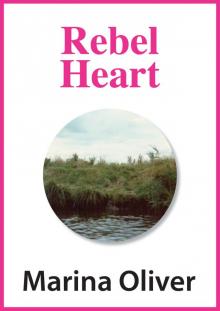 Rebel Heart
Rebel Heart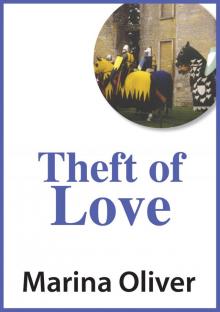 Theft of Love
Theft of Love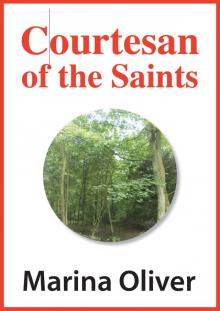 Courtesan of the Saints
Courtesan of the Saints Fatal Slip
Fatal Slip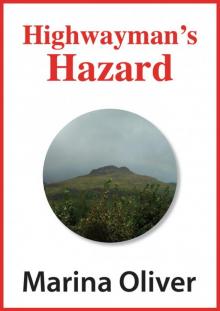 Highwayman's Hazard
Highwayman's Hazard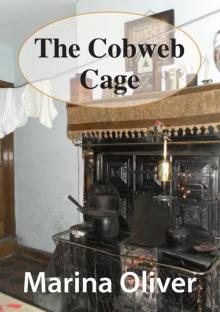 The Cobweb Cage
The Cobweb Cage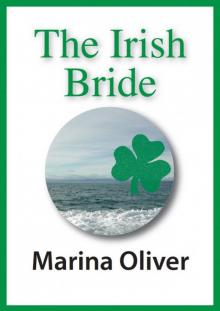 The Irish Bride
The Irish Bride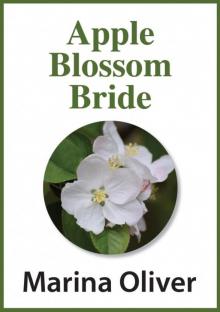 Apple Blossom Bride
Apple Blossom Bride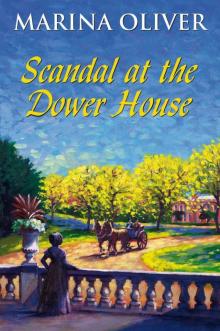 Scandal at the Dower House
Scandal at the Dower House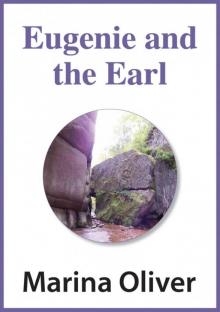 Eugenie and the Earl
Eugenie and the Earl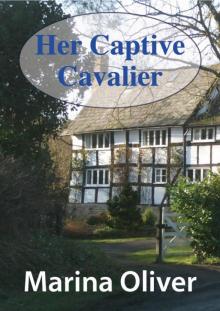 Her Captive Cavalier
Her Captive Cavalier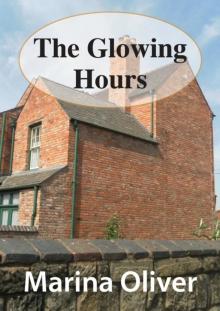 The Glowing Hours
The Glowing Hours Sibylla and the Privateer
Sibylla and the Privateer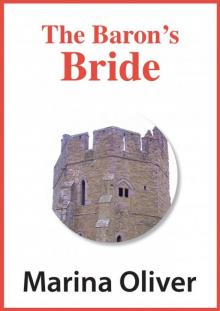 The Baron's Bride
The Baron's Bride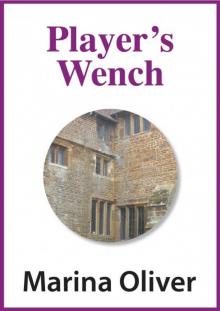 Player's Wench
Player's Wench Gavotte
Gavotte The Chaperone Bride
The Chaperone Bride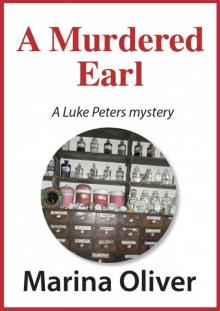 A Murdered Earl
A Murdered Earl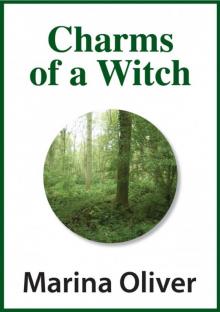 Charms of a Witch
Charms of a Witch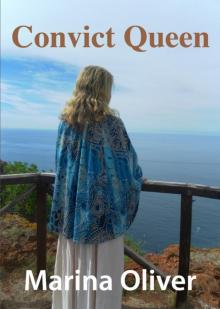 Convict Queen
Convict Queen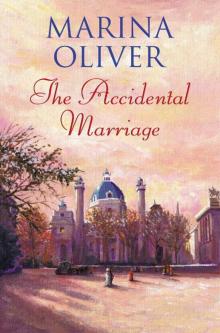 The Accidental Marriage
The Accidental Marriage